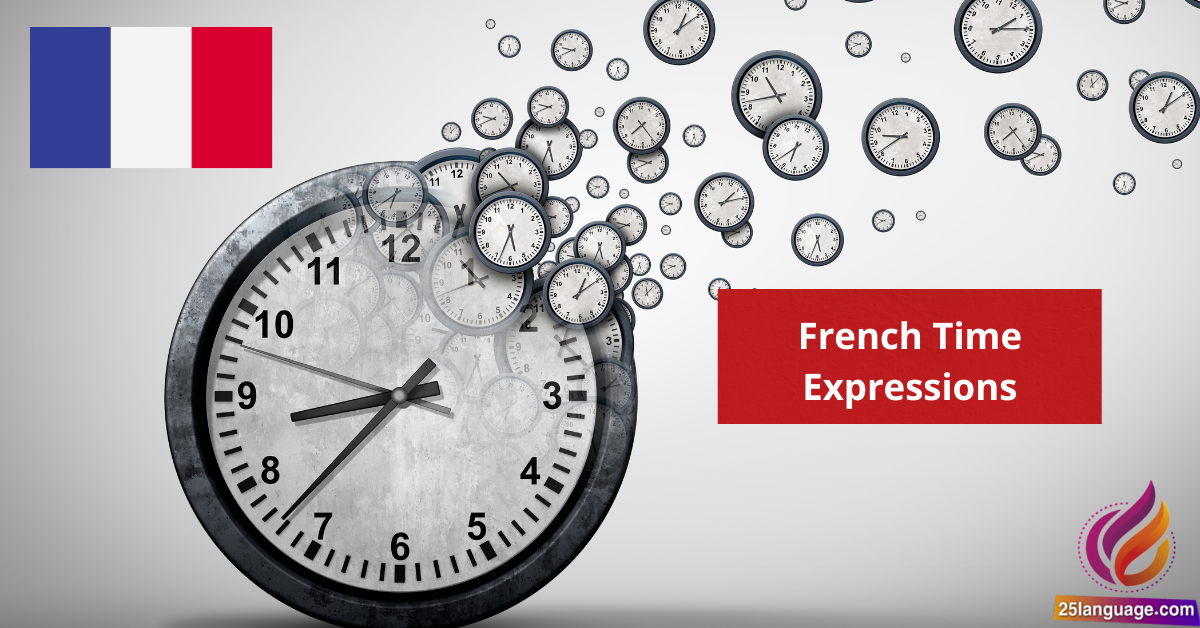French Time Expressions

Understanding time expressions is essential for mastering the French language, as they help you articulate when events occur. In this lesson, we’ll explore key phrases like “depuis,” “il y a,” and “pendant” that will enable you to discuss past and ongoing actions wiht ease. By the end, you’ll confidently express the timing of activities and enhance your conversational skills, making your interactions in french more dynamic and precise.Let’s dive in!
Mastering French Time Expressions for Everyday Conversations
To navigate everyday conversations in French, it’s essential to grasp time expressions, which help indicate when actions occur. The basic structure involves using specific nouns and verbs that denote time. Common time expressions include hier (yesterday), aujourd’hui (today), demain (tomorrow), and maintenant (now). these expressions can be used to form simple statements,such as Hier,j’ai mangé à 12 heures (Yesterday,I ate at 12 o’clock) or Maintenant,je travaille (Now,I am working). It’s essential to note that when indicating a time range, such as la semaine dernière (last week) or le mois prochain (next month), the definite article ‘la’ or ‘le’ is utilized with the noun.
Furthermore,using specific verbs with temporal phrases adds clarity to your conversations. For instance, the verb être (to be) can be combined with time expressions for various statements. Consider the following examples: Il est 3 heures (It is 3 o’clock) or Nous sommes en été (We are in summer). The use of dans (in) and dans une heure (in an hour) offers an indication of future timing. To illustrate further, you might say, Je vais au cinéma dans une heure (I am going to the cinema in an hour).
| French Example | Rule | English Translation |
|---|---|---|
| Hier | Indicates past (yesterday) | Yesterday |
| Demain | Indicates future (tomorrow) | Tomorrow |
| Il est 3 heures | Using être with time | It is 3 o’clock |
| Nous sommes en été | Using être with seasons | We are in summer |
| Je vais au cinéma dans une heure | Indicates future action | I am going to the cinema in an hour |
unlocking the Secrets of Depuis, Il y a, and pendant in French
In French, understanding time expressions like “depuis,” “il y a,” and “pendant” is crucial for discussing when events occur. Each of these terms serves a different purpose and timeframe. Firstly, “depuis” is used to indicate a duration that started in the past and continues into the present. Such as: Je vis à Paris depuis 2010. (I have been living in Paris as 2010.) This structure shows that the action began in the past and is still ongoing. In contrast, “il y a” is used to express that something happened a certain time ago. For instance: Il y a deux ans, j’ai commencé à apprendre le français. (Two years ago, I started learning French.) Here, the event is completed, and the time frame refers to a point in the past.
Lastly, “pendant” is used to talk about something that took place for a specific duration in the past, often highlighting its entirety. Such as: Elle a étudié pendant trois heures. (She studied for three hours.) This emphasizes the duration of an action that has been completed. The following table summarizes these differences for further clarity:
| French Expression | Rule/Usage | English Translation |
|---|---|---|
| Depuis | Indicates a continuous action starting in the past and continuing in the present. | Sence / for |
| Il y a | Refers to a completed action that occurred a specific time ago. | Ago |
| Pendant | Describes the duration of a completed action in the past. | For |
Practical Insights into french Time Expressions for Effective Communication
French time expressions play a crucial role in everyday conversation, allowing speakers to convey time-related data clearly and effectively. Understanding these expressions involves grasping various elements, such as specific vocabulary and grammatical rules.Here are some essential time-related phrases and their structures:
- À quelle heure? (at what time?)
- Il est… (It is indeed…) – for telling time:
- Il est trois heures. (It is three o’clock.)
- Il est midi. (It is noon.)
- Il est minuit. (It is indeed midnight.)
- Dans… (In…) – to talk about future time:
- Nous partons dans une heure. (We are leaving in one hour.)
- Je reviendrai dans une semaine. (I will return in a week.)
Furthermore, French utilizes various adverbs and phrases to express frequency and duration. Here’s a simplified table highlighting common time expressions and their meanings:
| French Expression | Meaning in English |
|---|---|
| Souvent | frequently enough |
| Tous les jours | Every day |
| Une fois par semaine | Once a week |
| De temps en temps | From time to time |
| Parfois | Sometimes |
Navigating Time in french: Essential Expressions for Learners
To navigate time in french, it’s essential to grasp both vocabulary and expressions concerning days, months, and time. Here are key terms and phrases:
- jour – Day
- Semaine – Week
- Mois – Month
- Année – Year
- Matin – Morning
- Après-midi – Afternoon
- Soir – Evening
Common expressions to refer to specific times include:
- Quelles heure est-il? – What time is it?
- Il est deux heures. – It is two o’clock.
- Demain – Tomorrow
- Hier – Yesterday
| French Expression | English Translation |
|---|---|
| Je vais le faire demain. | I will do it tomorrow. |
| il y a une semaine. | A week ago. |
| Aujourd’hui | Today |
| À quelle heure commence le film? | What time does the movie start? |
When discussing time, it’s crucial to know how to ask about and refer to specific days and times. Here are some additional useful phrases:
- Nous sommes le lundi. – It is indeed Monday.
- La réunion est à trois heures. – The meeting is at three o’clock.
- Ce mois-ci – This month
- Le mois prochain – Next month
Key Takeaways
nous avons exploré ensemble les expressions temporelles en français, telles que “depuis”, “il y a” et “pendant”. Ces outils fondamentaux vous permettront de parler avec précision des durées et des moments passés, présents et futurs dans vos conversations.N’oubliez pas que “depuis” est utilisé pour indiquer une action qui a commencé dans le passé et continue encore aujourd’hui,tandis que “il y a” vous aidera à situer un événement dans le passé,et “pendant” est parfait pour parler de la durée de quelque chose.
Je vous encourage à pratiquer ces expressions dans vos échanges quotidiens et à les utiliser lors de discussions sur vos expériences, passées ou présentes. Ne perdez jamais de vue que la pratique rend parfait ! Plus vous vous entraînez, plus vous serez à l’aise avec ces notions. N’hésitez pas à créer des phrases, à engager des conversations ou même à écrire un petit journal en français utilisant ces expressions.souvenez-vous, chaque phrase que vous construisez vous rapproche un peu plus de la maîtrise de la langue. Continuez à explorer et à apprendre, et surtout, amusez-vous en mettant en pratique vos nouvelles connaissances. Bonne chance et à bientôt dans un prochain cours !





























